Quantitative Imaging, Phenotyping & Sorting (QuIPS)
Understanding cancer at the cellular level
Single-cell technologies are foundational requirements for cancer and blood disorder research. Understanding cancer at the single-cell level is critical as tumours are not made up of a single population of cells, but rather distinct yet interacting populations of cells. Each cell type has an impact on tumour development, disease progression, response to treatments, and resistance to certain drugs. By identifying and understanding how different cell populations act and interact with each other, the new technologies will provide the necessary insight to identify the molecular events driving cancer development and progression, disease resistance and disease recurrence. With this information, novel biomarkers of disease may be identified that in turn, may help inform treatment options.
A platform supporting innovation and recruitment
The importance of this technology to expert scientific recruitment cannot be overstated. The best and brightest scientists take positions in centres that provide research opportunities at the single-cell level. The research enabled and accelerated through the acquisition of this infrastructure will increase visibility and provide opportunities for publication in high-impact journals, which in turn will bolster the Institute’s ability to attain national and international research grant funding.
Integrating technologies in new lab space

Dr. Kirk McManus, Senior Scientist at the Institute, is leading the development of the Quantitative Imaging, Phenotyping & Sorting (QuIPS) platform, a new central platform within the Research Institute consisting of six state-of-the-art, leading-edge interconnected technologies that work together as a powerful system and that can be immediately integrated into current research programs and help advance future national fundamental, translational, applied, and clinical research projects and programs.
- Single-Cell Sorting (isolation)
- Multi-omic Sample Preparation (characterization)
- High-throughput, Multi-dimensional Imaging Microscopy (quantification)
- Spatial Tissue & Tumour Biology (quantification)
- Protein Analyses (quantification)
- Genome Editing & Regulation (cancer modelling)
The timing for establishing such an important new platform is ideal since the Institute has begun the process of remodelling its current laboratory space, and the equipment can be readily incorporated into the latest design and made available to all researchers.
For more information about the QuIPS platform, please visit the Official website.
Research Platforms — Tools of Discovery
The Research Institute provides several core resources, or platforms, to member scientists that enable the advancement of their research. The platforms, detailed below, include specialized technologies, equipment, data, and services. While each platform has important scientific applications on its own, the collective suite enables collaborations and synergies across research disciplines. Thus platform investment decisions are an important strategic function of CancerCare. Funding for the platforms includes the CancerCare Manitoba Foundation, managed research grants, and various funding agencies, universities, and government bodies.





